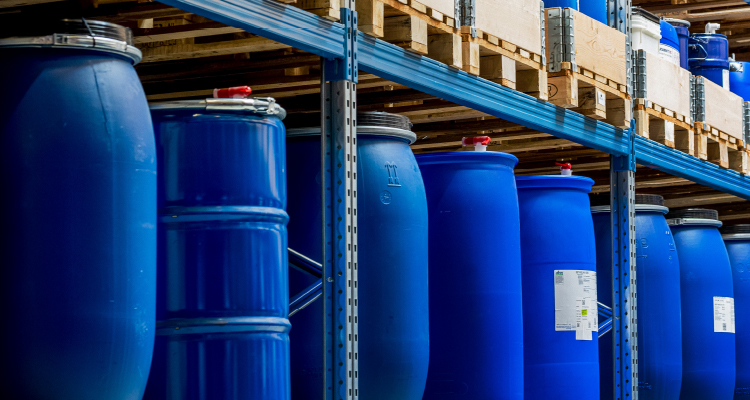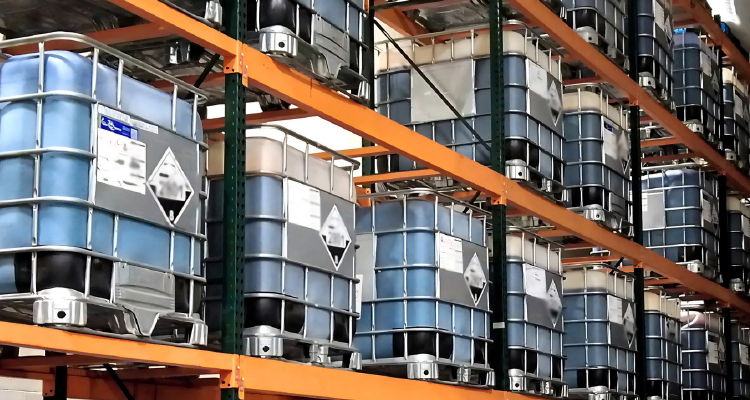The Chemistry of Trust: Logistics Leaders Reinvent Chemical Supply Chains

In a high-stakes, highly regulated environment, top logistics providers blend innovation and institutional knowledge to secure safer, smarter, and more sustainable chemical transportation for a shifting global market.
The chemical distribution sector in America directly or indirectly employs nearly 100,000 people who prepare and transport chemical products to 750,000 end users in almost every industry, according to the Alliance for Chemical Distribution (ACD).
As important as the chemical distribution sector is, it’s not immune to the changes and challenges impacting many industries. “This year was marked with tailwinds and headwinds,” says Eric R. Byer, ACD president and CEO.
One example is supply chain disruption. Challenges that initially impact one region, such as a weather event, can throw off supply chains on the other side of the globe.
“Even organizations that aren’t geographically close to the area are impacted by ‘the butterfly effect,’” says Robert Boyle, managed services division president with Odyssey Logistics, referring to the theory that describes how small changes to a system’s condition can produce dramatically different outcomes.
“None of these issues are local,” Boyle adds. “These are deeply entrenched supply chain challenges that eventually touch everybody that participates.” Successful chemical logistics companies need to get ahead of the disruptions and decide how to respond.
Tight Labor Market
The driver shortage remains an ongoing challenge, particularly when shippers need drivers skilled in the regulations and processes that govern chemical transportation. But trying to attract more workers by raising wages increases transportation costs, notes Scott Buber, director, chemical division, operations, and regulatory compliance with Warehouse Specialists, LLC (WSI), one of the largest privately held logistics companies in the United States.
Along with the driver shortage, there has also been an increase in non-driver personnel changes over the past year, which severely impacts how supply chain challenges are addressed.
“Given complicated insurance policies, strict equipment and shipping requirements, and prior cargo restrictions, much of the success of moving bulk chemicals relies on relationships and experience,” says Heston Hodges, president and CEO of Logistics Management Resources, Inc. (LMR), a non-asset-based logistics provider specializing in bulk chemicals.
Changes in terminal managers, office personnel, and drivers can lead to performance issues, which might range from a late delivery to product contamination.
“In the past year we have seen many high-performing carriers challenged by losing a terminal manager and/or a subset of drivers,” Hodges says. “And, it takes time to rehire and retrain.”
“Automating manual processes can also boost visibility within logistics operations,” says Ashley Lindsey, director of sales at the KC Regional Service Center for Trinity Logistics, a Burris Logistics company. “Visibility has taken on new importance, given ongoing supply chain disruptions.”
Some visibility solutions can tell where products are located, as well as get detailed information such as whether upstream obstacles in the supply chain might create delays that impact customers. Logistics companies can then act—say, by allocating products between distribution centers—to mitigate bottlenecks before they materialize.
Leveraging Technology

Leading chemical logistics providers leverage industry relationships and expertise to ensure bulk chemicals move safely and successfully.
Once technology provides visibility into a supply chain, optimization tools can help companies organize and combine shipments so they can reduce the number of trucks on the road, cutting both costs and the environmental impact. “Leveraging technology to plan and route shipments in an optimal way offers multiple benefits,” Boyle says.
“Visibility, such as that offered by transportation management systems (TMS), can help chemical companies and their clients manage labor shortages, keep spending in check, reduce risk, and boost efficiencies,” Lindsey says. “TMS solutions can also provide better analytical reporting so companies can make informed business decisions.”
This is key, as many chemical companies are paying more attention to costs, says Mark Lloyd, executive vice president with KAG Logistics, which provides cutting-edge transportation management solutions and value-added logistics services for the chemical and other sectors.
During the pandemic, timeliness was a primary focus. “Now, suppliers want to be more cost effective,” Lloyd says, adding that some shipments that used to move mostly by truck are being shifted to rail.
Growing Regulations
“The number of regulations governing chemical logistics continues to increase,” Lindsey says. “The growth is due, in part, to the heightened emphasis on sustainable practices and tighter environmental and safety regulations both in the United States and globally.”
For example, the EU’s directive on corporate sustainability due diligence, which went into effect in July 2024, requires some companies to identify and address any adverse environmental impacts of their actions within and outside Europe.
Across the United States, companies must comply with multiple clean air acts, lower emission standards, and reporting requirements. These rules impact both chemical manufacturing and storage, particularly for sites that transfer products.
For instance, to reduce emissions, California’s Advanced Clean Fleets Regulation requires that fleets are well-suited for electrification. This will be accomplished, in part, through requirements that manufacturers only produce zero-emission vehicles starting in the 2036 model year.
Fires and other accidents involving the transport of chemicals have prompted greater emphasis on safety and compliance with handling, packaging, and documentation requirements, particularly for cross-border shipments.
OSHA has increased the number of warehouse audits, Buber says. Among other areas of focus, it is looking at the safe handling of hazardous materials and checking that companies follow regulations regarding stack height and closure instructions on packages.
Ensuring Safety
Many chemical logistics companies diligently strive to comply with safety and environmental regulations. Nearly 100 transportation, warehousing, and logistics management companies are part of the American Chemistry Council’s Responsible Care® Partner Program, a safety and sustainability initiative.
The increase in cyberattacks across logistics firms and infrastructure sites, such as port operators, is another key consideration. In 2024, telecommunications, transportation, and shipping were the three sectors most targeted, according to a Trellix report. To protect themselves and their customers, chemical logistics firms need to implement their own backups and preventive measures.
“Another area of concern is cargo theft,” Lindsey says. The United States and Canada saw 3,625 reported incidents in 2024, up 27% from 2023, according to Verisk CargoNet. Targeted goods include copper products, consumer electronics, and cryptocurrency mining hardware.
“Rigorous carrier vetting and real-time safety monitoring don’t just support compliance—they’re critical safeguards against fraud. By verifying every credential, registration, and safety record, quality chemical logistics providers ensure only legitimate, qualified carriers move their customers’ freight,” says Lloyd. “It’s about protecting shippers, logistics providers, and the integrity of the supply chain. This is especially important in the chemical space.”
The New Normal
Starting in April 2025, the imposition and then reversals of multiple tariffs created uncertainty for chemical companies and the chemical logistics sector, says Michael Zimmerman, partner in the strategic operations practice of Kearney, a management consultancy. The uncertainty generated volatility and depressed demand on the part of shippers.
The ACD supports the renewal of the Generalized System of Preferences trade program, Byer says. This works to reduce the tariff burden on products essential to U.S. industries.
Today’s disruptions and challenges appear likely to remain, although perhaps taking on new forms.
Technical tools, such as visibility solutions and automation, along with human insight, can help shippers navigate these challenges. “Chemical logistics is complex,” Boyle says. “A great deal of work and expertise is needed to develop a strong chemical network across various modes.”
The companies profiled here bring the experience, insight, and dedication needed to make this happen.
LMR: ‘We Don’t Mimic Solutions; We Create Them’

LMR specializes in moving bulk hazardous materials, and qualifying and managing carriers to the highest safety standards.
Launched in 1981, LMR was one of the first 3PLs in the chemical space, as well as the first logistics provider to achieve ISO certification in North America. “LMR’s business, processes, and systems are specifically designed to service the complex bulk liquid and dry chemical markets,” Hodges says.
The company’s state-of-the-art IT solutions, along with its deep experience and close relationships with bulk chemical carriers, place it at the forefront of the chemical logistics industry. Operating effectively in this space requires rigorous oversight and automating services such as carrier compliance, problem resolution, and auditing, and LMR excels at each of these, Hodges says. “Our clients can rest assured that their business is being handled by known, vetted carriers in the chemical vertical,” he adds.
Most of LMR’s carrier relationships extend back decades, and they’re as valued as the company’s client relationships. “My dad started the business as a carrier,” Hodges says. “We come with a legacy of knowing how carriers feel and operate, and we know they’re not a commodity.”
LMR works closely with its carrier partners to ensure their operations are best-in-class and meet shippers’ expectations for reliable, quality service.
In contrast to some providers, LMR’s mentality is to ‘own’ a client’s problem versus relaying issues back to the client to create a solution. As a result, the client doesn’t have to dedicate personnel to creating a solution. LMR experts are available 24/7 and quickly provide responses to customers’ inquiries.
“Our customers are buying our expertise—all our employees are trained in bulk chemical shipments—and our ability to manage their shipments from ‘cradle to grave,’” Hodges says.
“LMR truly operates as an extension of the client’s team and is focused on their success,” he says.
To that end, LMR regularly conducts business reviews, provides actionable insights, and searches for trends and continuous improvement opportunities. The improved capacity and shipping and delivery performance LMR provides has directly helped clients boost their sales.
Recently, LMR attracted a client whose previous logistics provider wasn’t offering a completely reliable logistics service, due to the provider not ‘owning’ problems as they arose, gaps in the track-and-trace capability, and a limited bulk carrier network. LMR was able to solve each of those limitations with experience and relationships, including improving track-and-trace to more than 95% accuracy.
A recently completed tech initiative enhances the capabilities available through LMR’s transportation management system (TMS), including automated data exchange, and real-time visibility and operational reporting.
“This advances our ability to continue to deliver quality service and operate as a reliable, effective extension of our clients’ teams,” Hodges says.
In addition to vast shipping experience across all shipping modes, LMR’s feature-rich TMS supports clients by offering real-time costing information, comprehensive shipment tracking, and simplified freight audit and invoicing, among other capabilities. By leveraging its own middleware system, LMR offers quick turnaround on customized, automated reporting/EDI at no cost to its clients.
“Most importantly, unlike our competitors, our TMS platform is not a direct cost to our clients or our carriers, nor are there additional subscription fees,” Hodges says. “We are not a TMS seller, but rather use the TMS to deliver our clients a process-based solution customized for their needs.”
Odyssey Logistics: Transforming Complexity into Opportunity

Odyssey Logistics offers a suite of chemical logistics services that are purpose-built to resolve supply chain issues and keep chemical shipments moving safely, sustainably, and on time.
Initially spun off from Union Carbide’s logistics operations about 22 years ago, Odyssey Logistics supports chemical customers through its operations in Asia, Europe, and North America, and across all modes of transportation.
“Our roots are in chemicals and we’re proud of this,” Boyle says. “Chemical logistics is complex and not without risk. Our expertise distinguishes us.”
The American Chemistry Council has certified Odyssey as a Responsible Care® partner company. Odyssey also belongs to the European Chemical Industry Council. Its Project CloverLeaf ™ helps clients track and quantify their environmental impact and then reduce their carbon footprint, using AI and real-time data collection tools. The solution also highlights opportunities to cut costs and boost profit.
Intermodal Relief Valve
Odyssey’s extensive intermodal offerings help tackle disruptions, bottlenecks, sustainability requirements, and other challenges. “Intermodal transportation can act like a relief valve,” Boyle says. In May 2024, Odyssey established a new intermodal division headquarters in Illinois.
A robust sample fulfillment program helps numerous chemical company clients boost their own business. “A sample is often a precursor to a sale, so it’s an area of focus with our chemical customers,” Boyle says. Odyssey has shipped more than 14 million samples across North America, Europe, and Asia. Nearly all—95%—ship within 24 hours, and 100% ship within 48 hours.
Odyssey’s sample program also provides visibility to sample orders, real-time inventory management, detailed reporting and compliance, while automating many processes. “It can turn a sampling operation into an enabler for sales,” Boyle says.
To address growing demand for these specialized services, in late 2024, Odyssey acquired OctoChem, Inc., a sample fulfillment company with two decades of experience. The acquisition adds warehouse capacity and value-added services.
Odyssey works with a chemical company that had been processing more than 11,000 sampling orders each year with largely manual processes, which led to quality issues, potentially impacting sales. Odyssey assumed responsibility for the sample program, implementing its proprietary system and leveraging its carrier network. The partnership helped to increase customer satisfaction, even while delivering cost savings. “Any time we can help a customer grow, it’s a wildly successful partnership,” Boyle says.
The company’s consulting arm also provides value to many chemical clients. Optimization studies can help logistics and supply chain managers determine how to optimize their network, whether for cost, geography, risk, and/or the ability to quickly serve customers, among other parameters.
For example, an optimization study can help a company assess how a move to nearshoring might impact its domestic manufacturing and distribution network. “Through our data science and modeling teams, we can provide a high level of visibility to multiple scenarios,” Boyle says.
While technology is essential, human expertise remains critical. “Through the confluence of our employees’ deep expertise and our technology we compound the value we can offer customers,” Boyle says.
Trinity Logistics: People-Centric Freight Solutions

Dedicated team members at Trinity Logistics embrace the company’s core values of “Make it Happen,” “We, not Me,” and “Personal. Service. Excellence.” Trinity supports complex chemical supply chains with customized tech solutions and trusted carrier partnerships.
Three core values drive team members’ actions at Trinity Logistics, a full-service third-party logistics provider. “These are ‘Make it Happen,’ ‘We, not Me,’ and ‘Personal. Service. Excellence,’’’ Lindsey says. “These values, along with a culture of family and servant leadership, have enabled Trinity to develop effective logistics and supply chain operations for its clients for more than 45 years,” she adds.
Through the expertise it has gained from decades of experience and its best-in-class technology, Trinity has helped chemical companies more effectively manage their often-complex supply chains. Its team members understand the chemical industry, including its evolving and complicated regulations.
By building relationships with many specialty carriers, Trinity can help chemical shippers find ones that best fit their shipping needs. Trinity can also provide improved visibility through its customizable technology solutions.
Trinity recently earned a silver sustainability medal rating from EcoVadis, which provides a global standard for business sustainability assessments. “We were extremely excited to go from our original bronze rating to silver within one year. We’re very proud of this accomplishment,” Lindsey says, adding that they’re working to earn gold in 2025.
Trinity also continues as a Responsible Care® partner, a role it has proudly held since 2009.
Through its work with a leading chemical company that provides post-patent crop protection products, Trinity helped the supply chain organization streamline and automate its logistics operations. Employees had been using largely manual processes, which often led to duplicate steps, as well as errors and wasted time.
The company needed a transportation management solution that would automate many of these processes and seamlessly integrate with its ERP solution. Management was also looking for insightful analytics that would help it manage change and rein in freight expense.
Streamline for growth
Trinity Logistics leveraged its expertise in freight optimization to provide enhanced data visibility and custom reporting. Through its integrated outsource solution, Trinity stationed a freight management professional on-site to ensure seamlessness in coordinating shipments.
By leveraging Trinity’s technology platform and management insight, the company has been able to position itself for greater growth and profitability, while cutting its risk exposure. Among other improvements, on-time pickup performance now tops 97% while on-time delivery stands at 98.1%. Annual spending on LTL shipments has dropped by 8%.
“In addition, the analytics generated by Trinity’s system and experts have enabled the company’s salespeople to identify and focus on regions that were generating greater profit because the transportation costs were lower,” Lindsey says. “We’re true partners and like to focus on the big picture and goals of the business. Then, we can offer capabilities that provide benefits beyond the supply chain.
“Along with the technical capabilities Trinity offers, its team members’ dedication and commitment to service help the company stand out,” Lindsey says. “Living our values day-in and day-out is the true reason for our success.”
WSI: Raising the Standard

WSI operates four certified chemical warehouses for public lease across the United States, as well as additional dedicated and private chemical warehouse facilities.
As one of the largest privately held logistics companies in the United States, WSI offers a nationwide distribution network with a global logistics reach.
Over the past five years, it added four locations with specialty rooms, such as temperature-controlled storage rooms and containment areas that can store corrosives or toxins. These enable WSI to ensure it transports and stores products safely and efficiently, Buber says.
WSI also continues to enhance its digitalization capabilities. Its transportation and warehouse management solutions offer robust visibility, planning, tracking, and reporting along with predictive analytics, according to Buber.
Another area of focus within WSI is sustainability. WSI earned a bronze accreditation from EcoVadis and is just a few points away from silver.
Not only does this place WSI in the top tier of logistics providers, but it has generated multiple ideas for greener solutions across the company, Buber says. By utilizing electric lifts, changing to LED lights, and launching more recycling initiatives, among other efforts, WSI has saved thousands of dollars, which helps it serve clients even more cost-effectively.
In recognition of WSI’s ongoing commitment to safety and operational excellence, the company earned Partner of the Year within the Responsible Care® Program. “It’s the second time we’ve been blessed to receive this honor from our peers,” Buber says.
Another WSI initiative, Operation Clean Sweep, focuses on the plastics subsector within the chemical industry. Companies commit to doing all they can to reclaim plastic materials, so they’re kept from waterways or other natural habitats.
“It’s a voluntary program, but requires a rigorous audit,” Buber says. “We’re committed to making sure there’s zero loss and that we’re acting as a responsible, faithful steward of the community and environment, while operating safely.”
WSI helped a leading producer of advanced polymers and high-performance plastics address operational inefficiencies, inflated storage and handling rates, and an unacceptable rate of shipping errors. Through its flexible service offerings, WSI enabled the company to optimize its own facilities, while also leveraging the scale and expertise WSI could provide through its network of warehouses.
Along with traditional storage and handling, WSI performs minor blending operations, as well as bulk transfers of liquids and dry materials. With all the services it provides, WSI ensures seamless and contamination-free operations.
WSI’s team also provided IT support, human resources, and a rigorous training program. Between the process improvements, and by leveraging WSI’s established vendor relationships and flexible financing options, the company was able to save money and streamline operations.
In the chemical logistics sector, safety requires investing in appropriate infrastructure and protocols. “You can’t take shortcuts or cause unnecessary risks,” Buber says. WSI always has redundancy—that is, one employee holding another one accountable—to make sure all processes are completed correctly and safely.
“There’s a cost to having an extra person there, but dealing with an injury or regulatory violation costs far more,” he says. “Our customers and the regulators appreciate that we’re willing to make that investment because they know it protects everyone.”
KAG Logistics: Industry-Leading Transportation Management Solutions

KAG Logistics’ experienced and qualified personnel understand the unique challenges chemical companies face, and are committed to meeting these requirements.
From its start in bulk transportation logistics 20 years ago, KAG Logistics has evolved into a full-service provider for the chemical industry. In addition to bulk, the company manages truckload, LTL, rail, and intermodal shipments, and operates 18 transload facilities nationwide.
“Chemical logistics is our core competency—we know the business inside and out,” Lloyd says. “We understand the complexity of our customers’ supply chains. We know what’s important not just to them, but to their suppliers and customers, and we continually leverage our expertise and technology to identify potential improvements and efficiencies.”
KAG Logistics’ managed transportation solutions are designed to help shippers overcome common logistics challenges—such as limited capacity, poor shipment visibility, and resource constraints—by delivering scalable, technology-driven support. Through access to a vast carrier network, advanced tracking tools, automated workflows, and expert operational management, KAG Logistics enables customers to optimize performance, reduce costs, and focus on their core business with confidence.
For example, a leading chemical company’s customer base was expanding. However, its small, largely manual logistics operations constrained the potential growth. Among other challenges, the company’s limited carrier base led to missed business opportunities, while a lack of visibility tools limited the ability to gain real-time insights into shipment statuses, compromising customer service.
The company turned to KAG Logistics’ comprehensive managed services solution. KAG Logistics’ extensive network of qualified, vetted carriers is alleviating capacity constraints, while its Enhanced Tracking & Alert Solutions (ETA) track shipments in real time. These and other changes have helped to boost customer service levels, cut freight expenses by double digits, and enabled the company to expand its customer base. Additionally, by avoiding upfront investments in technology and additional staffing, the customer minimized overhead expenses and improved overall efficiency.
KAG Logistics provides robust technology solutions that offer inventory management, freight tracking and visibility, procurement, business intelligence, and many other capabilities. Its single-point TMS manages shipments from inception to conclusion, and can connect with both customers and vendors, boosting efficiency and streamlining communications.
The company’s broad carrier portfolio consists of more than 8,000 vetted carriers. “We take safety, security, and quality very seriously—we won’t just sign on any trucking company to move our customers’ freight,” Lloyd says. “We match the most qualified carriers to each specific load, based on training, experience, and safety performance. A dedicated carrier management team ensures each carrier is thoroughly vetted and continuously monitored throughout the partnership. Our TMS is connected to automated services, which monitor carrier safety ratings and alert our team when a carrier’s safety rating drops below the acceptable requirements,” he says.
